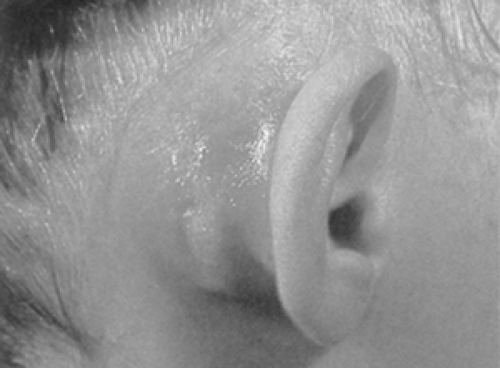Mastoiditis
Mark W. Kline
Inflammation of the mucoperiosteal lining of the mastoid air cells usually accompanies otitis media. Clinically evident suppurative infection, or mastoiditis, develops when inflammation causes progressive swelling and obstruction to drainage of exudative materials from the mastoid. Mastoiditis is uncommon in this era of effective antibiotic therapy for otitis media, but it remains a potentially life-threatening disease requiring prompt recognition and appropriate treatment.
CLINICAL MANIFESTATIONS
Almost invariably, children with mastoiditis have otitis media concomitantly. Classically, children with acute mastoiditis present with fever, otalgia, and postauricular swelling and redness. Typically, swelling occurs over the mastoid process, pushing the earlobe superiorly and laterally (Fig. 252.1); in infancy, it may occur above the ear, displacing the pinna inferiorly and laterally. The clinical presentation of acute mastoiditis may be fairly subtle, particularly in children who have received oral antibiotic therapy for otitis media (so-called masked mastoiditis). Mastoiditis should be considered in patients with otitis media unresponsive to antibiotic therapy.
Generally, chronic mastoiditis develops in individuals with long-standing middle-ear disease. The clinical course is indolent. Fever and local signs referable to the mastoid may or may not be present. Chronic purulent drainage from the ear and conductive hearing loss may occur.
DIAGNOSIS
In some cases, the diagnosis of mastoiditis can be made with confidence on clinical grounds alone. Plain-film roentgenography may show coalescence of mastoid air cells and loss of normal bony trabeculations. If osteomyelitis develops, sometimes sclerosis or destruction of adjacent bone is noted. Abnormalities on roentgenography of the mastoid bone do not necessarily imply mastoiditis, however; conversely, normal study results do not exclude the diagnosis. Sometimes, computed tomography is helpful in cases in which clinical findings and plain-film roentgenography are equivocal or nonspecific.
Stay updated, free articles. Join our Telegram channel

Full access? Get Clinical Tree









